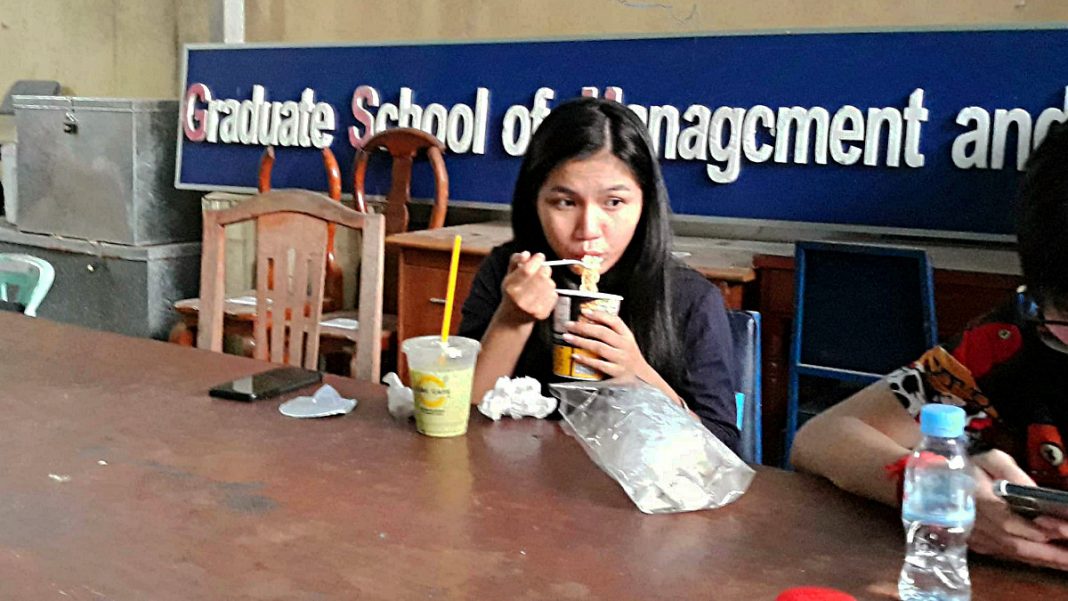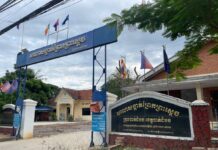During his first year of university, Chhai Yorn started to vomit in the mornings and struggled to sleep. He had developed stomach ulcers from skipping meals and eating junk food all the time, he said.
Yorn said he had trouble remembering his lessons while he was sick, which deepened his stress and made his ailments even worse.
Like Yorn, many Cambodian university students are facing health issues because of the pressure they are under: The difficulty of balancing studies with work is leading to unhealthy lifestyles and eating habits, students and nurses said.
The problem is particularly common among students who have just begun living away from home, they said.
“This is my first time living alone, away from my family,” Yorn said.
He shares a room with three friends, and the transition has been challenging, the second-year Pannasastra University business student said.
He had no time to prepare proper meals, and usually ate instant noodles during class.
“I knew it was not good for my health, but I had no choice so I recklessly ignored it until it got worse,” he said.
To reduce the financial burden on his family in Oddar Meanchey province caused by his university studies, Yorn was earning some money through full-time, paid volunteering at the Documentation Center of Cambodia, which archives records from the Khmer Rouge. But it left him little time to take care of himself.
“Rushing to school, I didn’t have enough time to cook for myself; therefore, I usually found easy ways to have a meal like noodles, potatoes and fried eggs several times per week,” he said. “I did not realize that I had a stomach problem because I think all students are experiencing the same conditions like me during their studies.”
But his condition gradually got worse, he said.
“It was not easy,” he said. He felt like vomiting in the mornings, and his breath was smelling worse, he said.
Several other students — even those who are not working — said they faced a similar situation.
Cheng Ratanak Sombo, a sophomore majoring in teaching English as a second language, also at Pannasastra, said she developed stomach problems in grade 12 while studying hard to pass her diploma, and it got worse during her first year of university.
“I normally studied at home alone until I forgot to eat dinner. Instead of having rice, I had an energy drink to help me stay awake to study longer. In the past, I drank one or two cans every single day,” Ratanak Sombo said.
She continued this routine until one day she suddenly fainted in the middle of class. Her teacher had to get her medical help.
A doctor told her to stop eating junk food and eat more regularly. However, she found it hard to maintain an appetite, she said.
“The doctor did not allow me to eat any kind of spicy food, and [said] I should eat healthy food every day,” she said. “But my favorite snack is mango with spicy salt and energy drinks. I’m always dying to eat these things. It’s hard to blame anyone as I cannot maintain my self-control.”
A recent survey of more than 1,300 Cambodian university students found that rates of inactive lifestyles and unhealthy food consumption were “concerning.”
“Public policy and universities should promote healthy behaviors among the students,” said the study, conducted by researchers from the Khana Center for Population Health Research and the Royal University of Phnom Penh.
About 10 percent of respondents said they had eaten no fruits or vegetables in the past seven days.
More than 83 percent of respondents drank at least one glass of soft drink or sweet tea a day, and about 40 percent ate fast food at least once a week, according to the study.
The research, posted online last year, also looked at sleeping habits and found that more than 50 percent had moderate or severe problems sleeping, with a further 33 percent having mild troubles.
According to Man Kanda, a nurse who specializes in internal medicine, health issues due to poor diets are a noticeable and growing concern among university students.
Young people tend to pay little attention to what they consume, she said.
“When people don’t have proper and substantial meals, it can bring many disadvantages to their health,” Kanda said. Symptoms could include stomach problems, weak immune systems and mental problems, she said.
Kanda said that for students, eating regularly and getting enough vitamins were a must, no matter how busy they were.
She recommended getting to sleep before midnight, eating breakfast before 9 a.m., having lunch every day, and taking dinner at least four hours before going to sleep. Students should also drink milk and exercise regularly, she said.
Yorn, the Pannasastra student who suffered from stomach ulcers, said he was now making an effort to be healthier.
“Now I know that I need to take care of my health first; otherwise, I cannot concentrate on my studies or my work,” he said. “It stressed me out and affected my mood whenever I was not feeling well. Plus, my mom was very concerned about me. I felt bad for causing this trouble for myself and others.”












